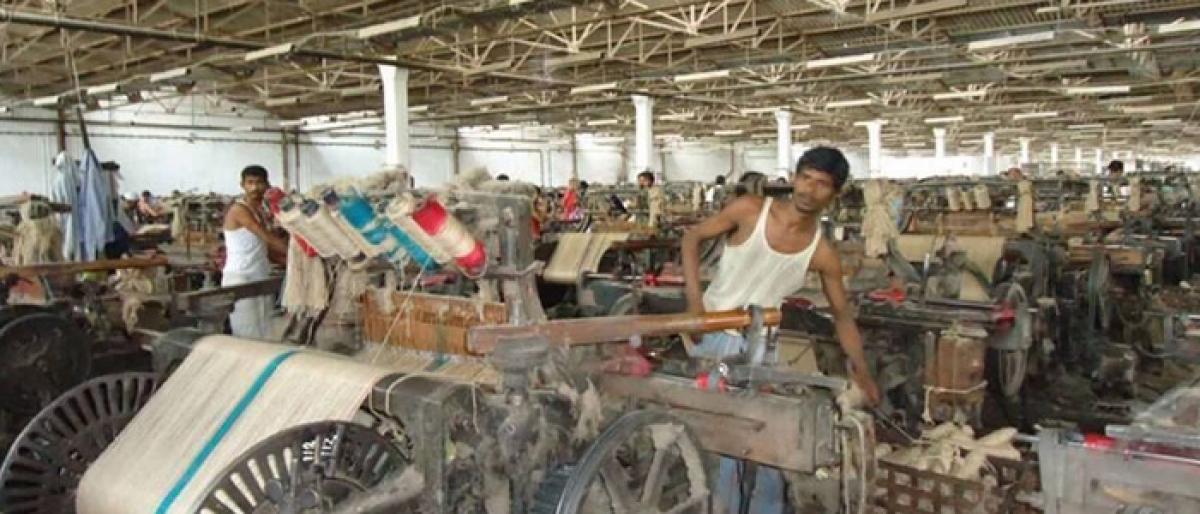Live
- ‘Get Set, Grow Summit 2024’ Focuses on Digital Detox for Families
- Stokes motivates his team to put in extra effort, says England pacer Potts
- From overcoming setbacks to leading India in U19 Women’s Asia Cup, Niki Prasad's amazing journey
- Driving Enterprise Security: Inside Venkata Reddy Thummala’s Leadership Journey
- Constitution debate: PM Modi hails 'Nari Shakti'; makes strong pitch for 'United Bharat’
- Abhijeet Bhardwaj: Revolutionizing Enterprise Analytics with Innovation and Expertise
- Bihar: Inquiry initiated against principal who went to buy veggies during school hours
- Press Sri Lankan Prez for release of Indian fishermen: TN Cong MP to EAM Jaishankar
- TN: DMK postpones executive meet due to heavy rains & Parliament session
- Porous silicon oxide electrodes can fix durability issues in batteries: Researchers
Just In

In a move that has irked the jute industry, the Centre has approved the use of 258,000 bales of poly bags for the rabi marketing season 2018-19 after the Department of Food and Public Distribution (DFPD) raised “concerns” over the shortage of jute bags for packaging food grain.
In a move that has irked the jute industry, the Centre has approved the use of 258,000 bales of poly bags for the rabi marketing season 2018-19 after the Department of Food and Public Distribution (DFPD) raised “concerns” over the shortage of jute bags for packaging food grain.
The DFPD had been peeved over the projected supply of only 1,564,000 bales of jute bags by March 2018, which prompted the ministry to propose dilution in the mandatory use of jute bags. This has paved the way for using poly bags to meet the shortfall.
“On the basis of consultations with the industry and recommendation of Jute Commissioner, Ministry of Textiles, has conveyed their approval for using 258,000 bales of HDPE/PP (High-density polyethylene/Polypropylene) bags for the rabi marketing season 2018-19,” an official said citing a communication from the DFPD to state officials and the industry.
Dismissing the ministry’s concern, jute millers, however, claimed the industry was equipped to deliver the entire requirement of jute bags but charged that the orders on government account were placed “late” and “not according to plan”.
Jute millers would request the Textile Ministry to reconsider its decision, an official of the Indian Jute Mills Association (IJMA) said. Deputy Jute Commissioner Dipankar Mahto recently wrote to the jute mills about plans to review their capabilities of manufacturing jute bags during the remaining period of the current rabi marketing season.
“In view of the concerns expressed by Union Ministry of Food over the supply of the planned quantity of 1,564,000 bales within March, this office will be reviewing the mill-wise supply performance,” Mahto said in the letter.
Terming the Food Ministry’s concern as “unfortunate”, IJMA Chairman Manish Poddar said: “Their concern does not seem correct. The industry is equipped to deliver whatever order they get provided the order comes at the right time and according to plan.” The industry has been clamouring from the first week of November for placing orders according to plan but the orders were placed late, he added.
“We would be dealing with the Textiles Ministry to reconsider its decision of diluting the norms and using poly bags,” Poddar said. “Initial advanced planning for rabi marketing season 2018-19 was done October-end wherein states were required to place indents in November of 271,000 bales, in December for 338,000 bales and in January for 308,000 bales, totalling 917,000 bales.
But the actual indents placed for the corresponding months have been 190,000 bales, 276,000 bales and 301,000 bales totalling only 767,000 bales,” an IJMA committee member said on condition of anonymity.
“The jute industry cannot be blamed for late placement of indents by procuring states, leading to bunching of orders that create an artificial shortage on availability of jute bags,” the committee member told IANS.
According to estimates, the Jute Commissioner’s office has already issued Production Control-cum-Supply Orders (PCSOs) for 1,059,000 bales up to March 13, 2018. Against the ordered quantity, jute mills have supplied 700,000 bales as on February 12 leaving a backlog of around 359,000 bales (33.8 per cent).
After the approval for use of poly bags, the revised plan suggests that 1,435,000 bales of jute bags are required for the kharif marketing season 2017-18 and rabi marketing season 2018-19. The Centre asked mills to “gear up their manufacturing capacity” and “accord top priority” to manufacture and supply of jute bags on government account.
“Reports have been received that a number of jute mills are selling jute sacking bags in the private market to realise a higher price at the cost of government supply by violating the order. This has primarily caused such large backlog on government account,” Mahto said in a letter to jute mills.
Citing sustainability of demand for jute products and extending support to 370,000 workers and four million farmers in the sector, the central government had allowed packaging of 90 per cent of food grain and 20 per cent of sugar products in jute bags for the current year under the mandatory packaging norms of the Jute Packaging Material Act, 1987.
By: Bappaditya Chatterjee

© 2024 Hyderabad Media House Limited/The Hans India. All rights reserved. Powered by hocalwire.com







